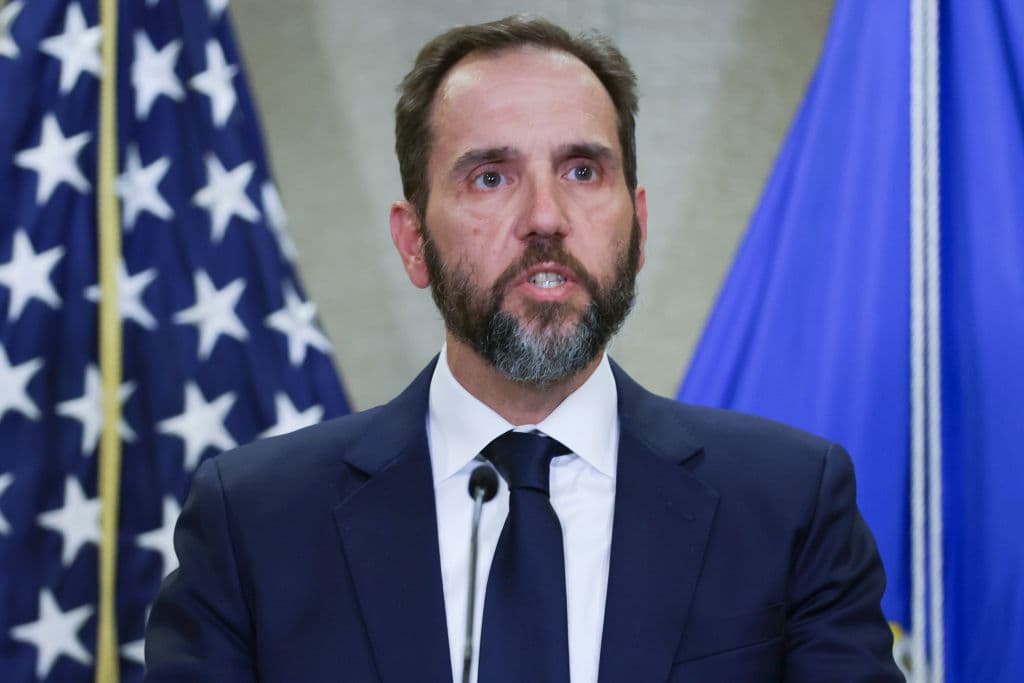Trump Denounces ‘Lawless’ Jack Smith, Claims ‘Absolute’ Immunity in Fiery Arguments to Judge Chutkan
The 45th president argues that the government has been remiss in its obligations to turn over evidence.

President Trump’s fiery contention that Special Counsel Jack Smith has, in his January 6 prosecution, engaged in “discovery violations” is emerging as the 45th president’s latest effort to rebut the four election interference charges he faces at the District of Columbia.
The contention came in a 34-page brief submitted by Trump’s legal team to Judge Tanya Chutkan, who is presiding over the case in the wake of the Supreme Court’s ruling in Trump v. United States that official presidential acts are presumptively immune. Trump contends that the case “should be dismissed” and “promptly” to protect the “integrity of the Presidency.”
Mr. Smith crafted a slimmed-down indictment — nine pages shorter, but with the same four charges — that he hopes can pass muster at the Supreme Court. He owes Judge Chutkan a brief next week explaining how he envisions the case moving forward given the protections of immunity that Trump will enjoy during the pendency of the prosecution.
Trump, though, is homing in on the Brady rule obligation of the government to provide the defense with any evidence material to the case that could be exculpatory at trial. The Supreme Court, in Brady v. Maryland, found that such an obligation flows from the Fifth Amendment’s promise that no one shall be “deprived of life, liberty or property without due process of law.” Prosecutors are required to turn over evidence irrespective of whether the defendant asks for it.
Now Trump argues that Mr. Smith conducted his “initial, disputed discovery review in this case at a time when the Office wholly denied the existence of Presidential immunity.” The Nine, he maintains, “established important parameters for the procedural and substantive consideration of this defense” that Mr. Smith “could not possibly have accounted for” when he produced discovery.
The former president argues that the immunity ruling so upends Mr. Smith’s discovery obligations that the government’s “lawless request to file a public defense of their defective Superseding Indictment before they are in compliance with their discovery obligations” ought to be denied. Judge Chutkan, though, has sided with Mr. Smith in ruling that immunity is the first order of business before the case can proceed.
Trump declares that he “will establish as a matter of law that Presidential immunity for official acts must be absolute and that presumptive immunity” is not sufficient to protect the safeguards of the presidency. Such a position goes further than the territory staked out by the Supreme Court, which held that he is “entitled, at a minimum, to a presumptive immunity from prosecution for all his official acts.”
That argument — which if accepted would likely neutralize the entire prosecution — would be made in what the Federal Rules of Criminal Procedure call a “Rule 12(b)(6) motion,” which is a request to dismiss charges for “failure to state a claim upon which relief can be granted.” Mr. Smith, though, will argue that the justices only granted “absolute” immunity to a subset of presidential acts that are within the president’s “conclusive and preclusive” authority, like the pardon power.
Trump’s concerns are more than strictly legal. His lawyers cite the concern that if Mr. Smith is permitted to make his immunity case to Judge Chutkan next week, the publication of that document would amount to “an improper motion for summary judgment in the court of public opinion.” Trump argues that the impact of such a brief is especially dangerous as the “election rapidly approaches.”
The former president takes the position that “any evidence of bias and hostility toward President Trump harbored by the prosecution team is discoverable.” The Department of Justice’s prosecution manual decrees: “It is the obligation of federal prosecutors, in preparing for trial, to seek all exculpatory and impeachment information from all the members of the prosecution team.”
Trump argues that the “prosecution team” arrayed against him comprises the White House and other agencies. If Judge Chutkan — or an appeals court — judges that to have merit, the evidentiary materials to which the former president is owed access will expand dramatically. Trump argues that “personnel from the D.C. United States Attorney’s Office, DOJ, and the FBI’s Washington Field Office must be considered part of the prosecution team.”
Judge Chutkan, whose prior rulings have strongly favored Mr. Smith, has shown little patience for the kind of delay that Trump now seeks. She has already denied one of his motions to dismiss, on the basis of selective and vindictive prosecution. The former president’s argument that the scope of discovery ought to be decided before immunity is addressed — and that the case ought to be dismissed — could suggest that his attorneys reckon that Mr. Smith’s path has not been entirely blocked by the high court.

